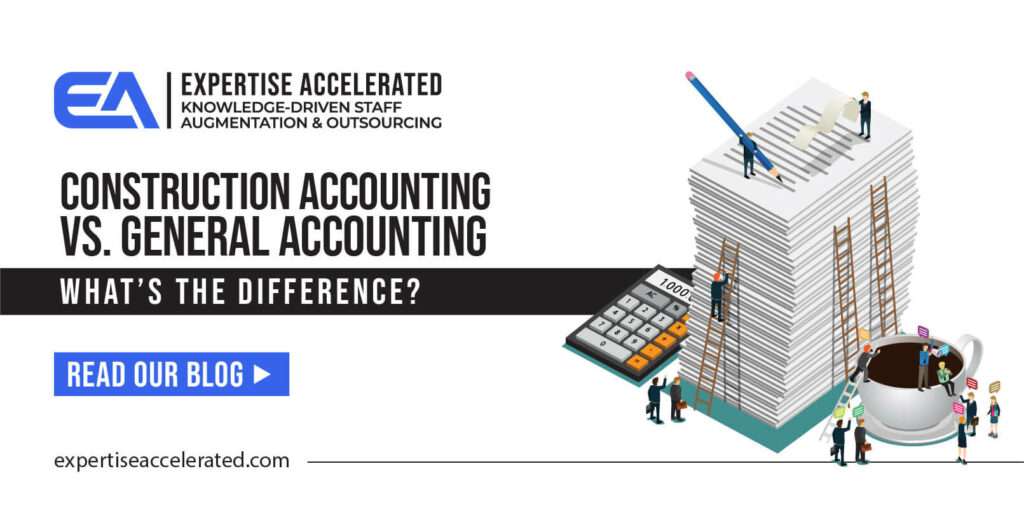Exploring the Relevance of Building Bookkeeping in the Construction Market
The building industry runs under unique monetary challenges that require a customized strategy to bookkeeping. Building audit not just makes sure the precision of monetary reporting however additionally plays a pivotal role in project monitoring by allowing efficient task setting you back and resource appropriation. By understanding its crucial principles and advantages, stakeholders can considerably influence task outcomes. The intricacies intrinsic in construction accountancy raising inquiries about finest methods and the devices offered to handle these ins and outs efficiently. What strategies can construction companies implement to enhance their economic processes and drive success?
Unique Obstacles of Construction Accountancy
Often, building bookkeeping provides unique obstacles that identify it from various other sectors. One main difficulty is the complicated nature of building and construction tasks, which often involve multiple stakeholders, rising and fall timelines, and differing laws. These variables demand meticulous monitoring of expenses related to labor, products, tools, and expenses to preserve task success.
Another considerable challenge is the requirement for exact work costing. Building and construction firms need to allot expenses to certain tasks accurately, which can be hard as a result of the long period of time of projects and the potential for unforeseen expenditures. This demand needs durable audit systems and practices to ensure prompt and specific financial reporting.
Additionally, the construction industry is vulnerable to transform orders and contract alterations, which can further make complex monetary monitoring and forecasting. Effectively making up these modifications is important to stay clear of disagreements and make sure that jobs stay within budget.

Secret Concepts of Building Audit
What are the foundational concepts that lead construction bookkeeping? At its core, building and construction bookkeeping revolves around precise monitoring of costs and revenues connected with certain projects.
An additional key concept is the application of the percentage-of-completion approach. This strategy acknowledges income and costs proportionate to the project's progression, giving a much more reasonable sight of financial efficiency gradually. Furthermore, construction accountancy emphasizes the relevance of conformity with accounting criteria and laws, such as GAAP, to make sure transparency and reliability in financial reporting.
Furthermore, capital monitoring is vital, provided the frequently intermittent nature of building jobs. Timely invoicing and handling repayment schedules assist keep liquidity. Reliable budgeting and projecting are essential for anticipating job expenses and financial results, making it possible for far better decision-making and source allowance. These concepts jointly develop a durable framework that sustains the unique financial needs of the building and construction sector.
Benefits of Effective Building And Construction Bookkeeping
Efficient construction bookkeeping supplies many advantages that dramatically boost the overall management of tasks. Among the main advantages is enhanced monetary visibility, enabling job managers to track costs accurately and monitor capital in real-time. This transparency facilitates notified decision-making, lessening the threat of budget plan overruns and guaranteeing that resources are allocated successfully.
Additionally, efficient building audit enhances conformity with governing requirements and sector criteria. By preserving accurate monetary records, business can easily give paperwork for audits and satisfy contractual obligations. This diligence not only promotes trust fund with customers and stakeholders but likewise mitigates potential legal threats.
Moreover, efficient bookkeeping techniques contribute to much better task projecting. By assessing past performance and economic patterns, building firms can make even more accurate predictions regarding future task costs and timelines. construction original site accounting. This ability improves calculated preparation and enables companies to react proactively to market variations
Tools and Software Application for Building And Construction Bookkeeping
A selection of specialized tools and software options are readily available for building and construction audit, each made to simplify economic management processes within the sector. These tools facilitate monitoring, reporting, and evaluating financial data particular to construction projects, ensuring precision and compliance with market criteria.
Leading software alternatives consist of integrated building and construction monitoring systems that incorporate task monitoring, budgeting, and accountancy performances. Solutions such as Sage 300 Building And Construction and Property, copyright for Contractors, and Viewpoint Vista offer features tailored to take care of work setting you back, pay-roll, and invoicing, making it possible for building companies to preserve accurate monetary oversight.
Cloud-based applications have actually gained popularity due to their availability and real-time partnership capabilities. Devices like Procore and CoConstruct enable groups to accessibility economic information from multiple areas, improving interaction and decision-making procedures.
Furthermore, building and construction bookkeeping software commonly sustains compliance with regulatory needs, assisting in audit trails and tax coverage. The integration of mobile applications additional boosts operational effectiveness by enabling area workers to input data straight, lowering errors and hold-ups.

Finest Practices for Construction Financial Management
Effective construction bookkeeping counts not just on the right devices and software yet likewise on the execution of ideal methods for financial administration. To accomplish original site reliable economic oversight, construction firms should prioritize routine and exact task budgeting. This process entails breaking down job costs right into detailed groups, which enables better tracking and forecasting of costs.
One more vital method is keeping a durable system for invoicing and cash money circulation administration. Prompt invoicing makes sure that repayments are received promptly, while attentive money circulation tracking helps protect against liquidity concerns. Furthermore, building firms need to adopt a rigorous method to work setting you back, examining the real expenses versus budget plans to identify variations and readjust methods accordingly.
Moreover, fostering transparency with extensive financial reporting improves stakeholder depend on and help in notified decision-making. Routine monetary evaluations and audits can likewise uncover potential inadequacies and areas for enhancement. Continuous training and growth of economic monitoring abilities among personnel make sure that the team remains proficient at navigating the intricacies of construction accountancy. By incorporating these ideal techniques, construction companies can improve their financial stability and drive task success.
Final Thought
In final thought, building and construction accountancy offers as a fundamental component of the construction sector, addressing one-of-a-kind difficulties and sticking to key concepts that boost economic precision - construction accounting. By implementing ideal techniques, building and construction firms can foster stakeholder count on and make notified decisions, eventually adding to the total success and sustainability of jobs within the industry.
Building and construction audit not only makes sure the accuracy additional reading of economic coverage however additionally plays an essential role in task administration by enabling efficient job costing and resource allowance. In addition, construction accounting stresses the importance of compliance with accountancy criteria and guidelines, such as GAAP, to ensure transparency and integrity in financial reporting.
Effective construction bookkeeping relies not only on the right tools and software program yet additionally on the implementation of ideal practices for economic management. Constant training and development of monetary monitoring skills among personnel make sure that the group stays skilled at browsing the intricacies of construction accountancy.In verdict, building and construction bookkeeping serves as an essential component of the construction industry, addressing special obstacles and sticking to crucial principles that enhance monetary accuracy.